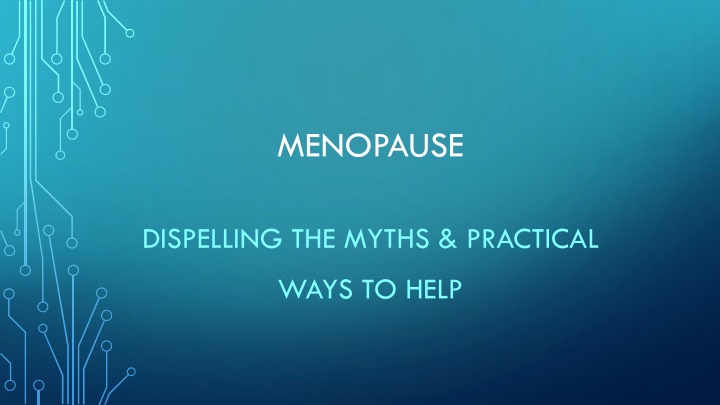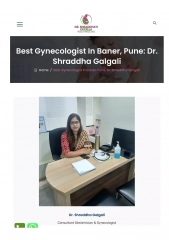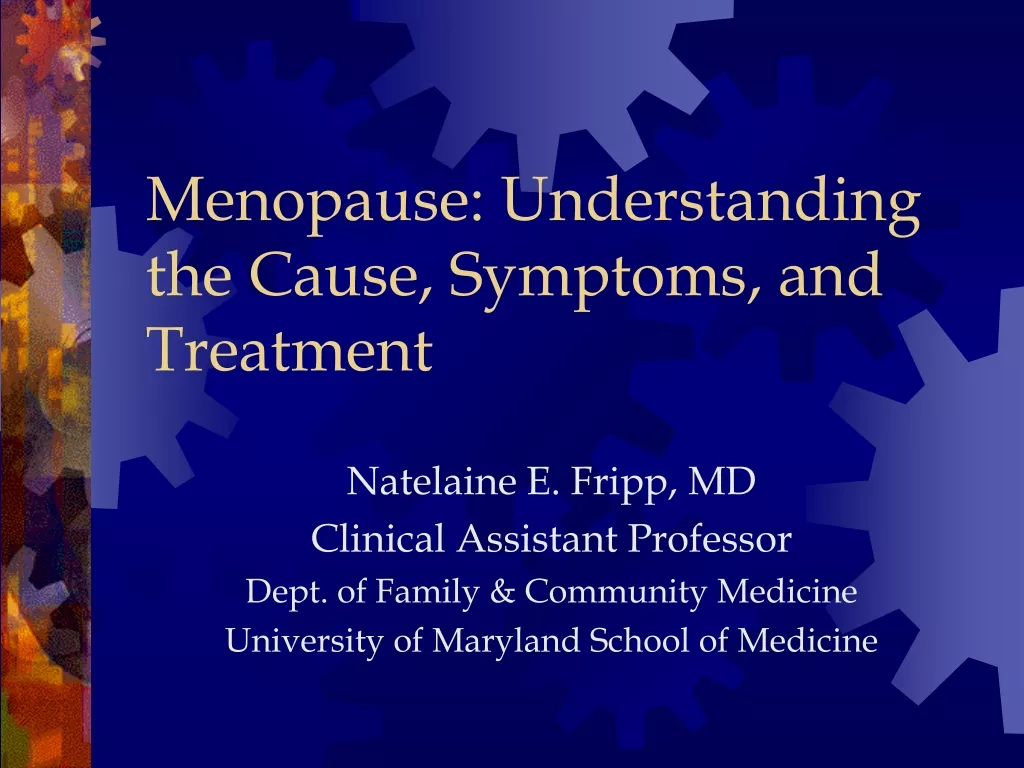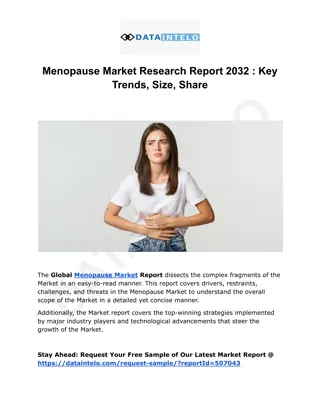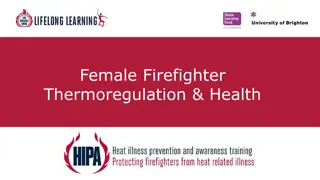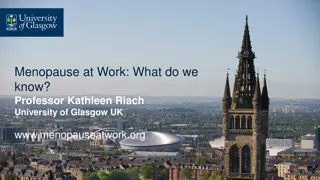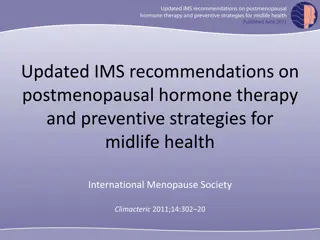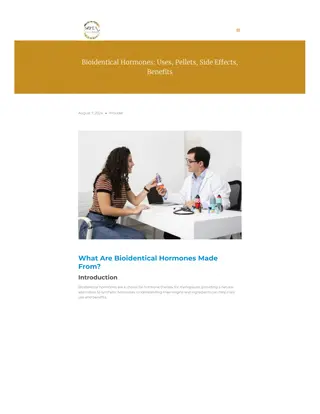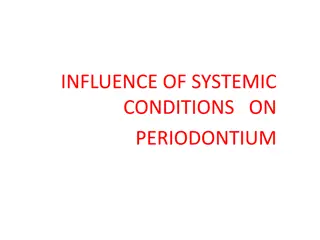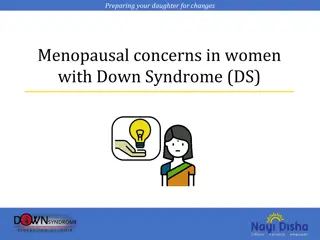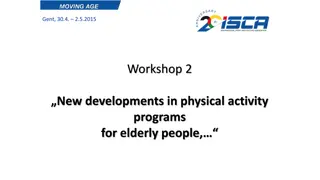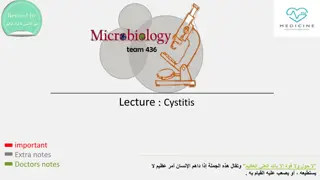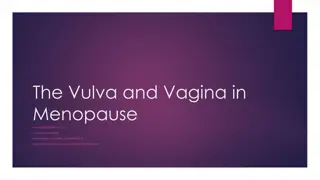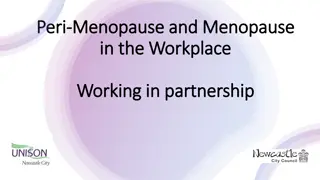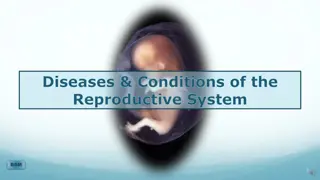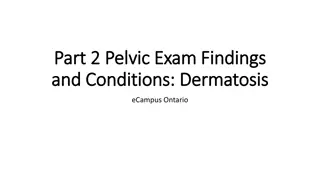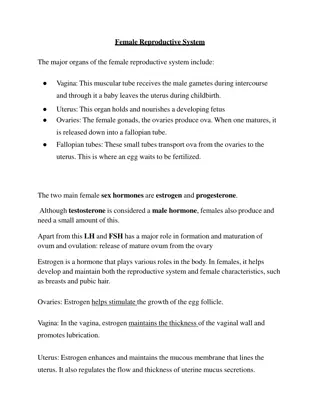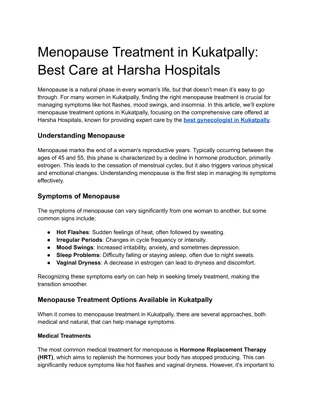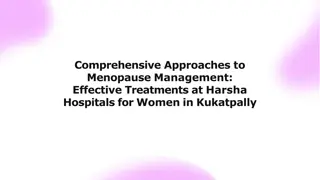MENOPAUSE
Menopause is a natural stage in a woman's life, marked by the cessation of menstruation. It's crucial to understand its onset, symptoms, and available treatments for symptom management. Learn about when menopause occurs, common symptoms like hot flushes and mood swings, and practical ways to control symptoms through lifestyle measures and medications. Take charge of your health during this transitional phase with helpful insights and guidance to navigate menopause effectively.
Download Presentation

Please find below an Image/Link to download the presentation.
The content on the website is provided AS IS for your information and personal use only. It may not be sold, licensed, or shared on other websites without obtaining consent from the author.If you encounter any issues during the download, it is possible that the publisher has removed the file from their server.
You are allowed to download the files provided on this website for personal or commercial use, subject to the condition that they are used lawfully. All files are the property of their respective owners.
The content on the website is provided AS IS for your information and personal use only. It may not be sold, licensed, or shared on other websites without obtaining consent from the author.
E N D
Presentation Transcript
MENOPAUSE DISPELLING THE MYTHS & PRACTICAL WAYS TO HELP
WHAT WE WILL COVER What is the menopause? When does it occur? What are the symptoms? How can I survive it? What treatments are available
WHAT IS THE MENOPAUSE? a biological stage in a woman's life when menstruation ceases permanently due to the loss of ovarian follicular activity A natural process-loss of ovarian function An end to periods! Symptoms usually start months-years prior to periods stopping (perimenopause- irregular periods) & treatments geared towards symptom control Often undertreated & can be a taboo subject
WHEN DOES IT OCCUR? Average age 51 (in UK) Definition-1 year without periods over age 50 or 2 years without periods if over 45 Often symptoms will start around age 45 before periods have stopped Can be diagnosed with a blood test (postmenopausal-FSH level is high) but better to focus on symptom control as often symptoms precede actual menopause & FSH level fluctuates in perimenopausal period so often not helpful! Premature menopause-under the age of 40, FSH then helpful (2 blood tests at least 6w apart)-will need HRT to protect bone health
SYMPTOMS Hot flushes/night sweats (75%) Mood swings/low mood/anxiety Dry skin/dry hair/hair thinning Loss of libido/vaginal dryness/soreness Poor concentration Palpitations Insomnia Urinary symptoms-frequency, incontinence
TREATMENT-SYMPTOM CONTROL Lifestyle measures Regular exercise, Avoiding smoking/alcohol/caffeine, Sleep hygiene, Diet-keep it low in saturated fat and salt to reduce blood pressure, and rich in calcium and vitamin D to strengthen bones
TREATMENT-SYMPTOM CONTROL Hot flushes Wearing cotton/use of fans/sleep in cooler room Avoidance of triggers Medications-antidepressants, clonidine Low mood CBT Self help groups antidepressants (also shown to help with hot flushes)
TREATMENT-SYMPTOM CONTROL Vaginal dryness Moisturisers/topical oestrogen (can use even if PMHx of breast cancer/DVT etc) Coconut oil Alternative/complementary therapies NICE advises to counsel that the quality, purity, & constituents may be unknown Some evidence that black cohosh & isoflavones may help with hot flushes but caution as safety is unknown & preparations may vary Accupuncture Review all treatments 3 months after starting
HORMONE REPLACEMENT THERAPY Replacing oestrogen-either systemically or vaginally Often feared! (by medical professionals too!) Lots of different formulations-tablet/patch/gel If taking oestrogen (systemically) and still have a uterus MUST take a form of progesterone (risk of endometrial cancer) Annual review, often will advise a trial without HRT, if symptoms return can discuss restarting
BENEFITS OF HRT Treatment of menopausal symptoms-most effective treatment, especially for hot flushes Use in those following oophorectomy or premature menopause Improve bone health-prevention of osteoporosis (prevention of decline in bone density), reduced risk of fragility fractures Improve cardiovascular health-in certain age groups provides protection from heart disease
HRT RISKS 2 large studies in 1990s suggested a link that extended use of HRT may increase risk of breast cancer and that it may increase risk of heart disease Mass panic! Reduction in numbers being prescribed HRT (66% drop) with subsequent return in symptoms, doctors still often confused & fearful When results analysed further-women in US study in mid 60 s & overweight (UK use of HRT in often much younger women 45-55) & it showed NO increase in heart disease in those taking HRT for 10yrs after menopause.
CARDIOVASCULAR DISEASE NICE advises that we should counsel women that: Overall, HRT does not increase the risk of CVD when initiated <60y and does not affect the risk of dying from CVD. The baseline risk of cardiovascular disease and stroke varies from individual to individual, and depends on the presence of cardiovascular risk factors. Existing evidence suggests that: Oestrogen-only HRT may (or may not) reduce the risk of CVD. Combined HRT is associated with little (or no) increased risk of CVD. Oral (but not transdermal) oestrogen slightly increases the risk of stroke but overall the risk of stroke is low in women <60y.
BREAST CANCER RISK NICE guidelines (2015) ask GPs to inform women: There is an association between HRT use and breast cancer, with some formulations appearing to carry more risk than others (combined vs oestrogen only) We should consider this risk in the context of an individual s other risk factors. Any absolute increase in breast cancer risk is small, related to treatment duration and reduces after stopping HRT However the risk of breast cancer associated with HRT use is lower than the risk associated with other lifestyle risk factors, e.g. obesity and alcohol.
VENOUS THROMBOEMBOLISM The risk of VTE associated with HRT is greater for oral than transdermal preparations. The risk associated with transdermal HRT given at standard therapeutic doses is no greater than baseline risk.
POSSIBLE SIDE EFFECTS OF HRT Oestrogen-related adverse effects, such as fluid retention, bloating, breast tenderness, nausea, headaches, leg cramps, and dyspepsia. Progestogen-related adverse effects, such as fluid retention, breast tenderness, headaches or migraine, mood swings, depression, acne, and lower abdominal pain. Bleeding
HRT SUMMARY For the majority of women who use HRT for the short-term treatment of symptoms of the menopause, the benefits of treatment are considered to outweigh the risks The lowest effective HRT dose should be taken, with duration of use depending on the clinical reasons for use. HRT remains licensed for osteoporosis prevention and can be considered the treatment of choice for women starting treatment below age 60 years, and especially for those with a premature menopause. Women on HRT should be re-assessed by their doctor at least annually. For some women, long- term use of HRT may be necessary for continued symptom relief and quality of life. If women start HRT around the time of menopause the risk is very small, but there is only limited data for continued usage beyond the age of 60. It is not usually appropriate for women over 60 to be starting HRT, as the WHI study shows, the risks are increased, but this does not mean that women who started HRT earlier should have to stop it on reaching 60.
NOT TO IGNORE!! ANY bleeding after periods have stopped Sign of endometrial cancer-will be referred as a 2ww Other diagnoses possible (still perimenopausal, vaginal cause etc) but needs to be checked-would have bloods & ultrasound-if any endometrial thickening would have a hysteroscopy & biopsy Also need to see GP if changes in cycle-heavier bleeding or bleeding between periods-if in doubt get checked out! Also important to keep up to date with breast and cervical screening Don t forget contraception!
QUESTIONS I went through the menopause about ten years ago, and managed without HRT. I m now sixty. A doctor on the radio the other day said there was evidence that post-menopausal women on HRT recover better from Covid- 19 than those who aren t on it, as oestrogen levels seem to be an important factor. Would it be a good precautionary measure to go on HRT now, or could the risks outweigh the benefits?
COVID-19 STUDY Men are more likely to have more severe symptoms of Covid, suspected that oestrogen is a protective factor Added additional questions to the Covid symptom study App re hormone use to analyse this Menopausal women were more likely to develop symptoms compared to women who were still having periods. However, postmenopausal women were not more likely to be hospitalized or need ventilation than those of a similar age who hadn t yet gone through the menopause. Does appear that oestrogen has a protective effect
COVID-19 STUDY Then looked at those using HRT-expecting a strong protective effect Surprisingly We did not find that hormone replacement therapy offered any protection against COVID-19. In fact, our data showed that women taking hormone replacement therapy were actually very slightly more likely to suffer symptoms of the disease However the questions weren t specific regarding type or route of HRT or how long they had been taking it for so very difficult to draw any conclusions. There is insufficient data from this study to determine whether or not taking some types of HRT provide some protection with respect to severity of COVID-19 infection. More research is required.
QUESTIONS What impact does caffeine have on pelvic floor?
INCONTINENCE/URINARY SX & PELVIC FLOOR Very common! Worse during/after menopause Impact on daily life/relationships/self esteem Lifestyle measures-avoiding caffeine (irritant, diuretic), reducing fluids in the evening, diet & exercise, smoking/alcohol Bladder diary Pelvic floor exercises, Squeezy App Bladder training Women s health physio Medications
QUESTIONS My mum had hormone related breast cancer-can I use HRT? Requires discussion of risks & would depend on age-?premature menopause or having had ovaries removed-some people would suggest fine to use up until average age of menopause (51). This would usually be a discussion with genetics/gynaecology to explore risks specific to that woman-likely would be advised to use alternative forms of symptom control due to increased risk of breast cancer rather than HRT. Can still use topical oestrogen.
QUESTIONS My hot flushes have gone from feeling like I am in a sauna and dripping sweat to a feeling of being roasting hot but not sweating, is this significant? I don t believe so, but be aware of any other symptoms A study in 2012 gives median duration of hot flushes as 8 years, NICE guidelines say symptoms usually resolve 2-5 yrs, but median duration >7yrs More likely in perimenopause/early into the process HRT is very effective (but as mentioned before want to use for shortest duration possible) Other options-lifestyle etc
RESOURCES www.menopausematters.co.uk www.womens-health-concern.org www.nhs.uk/conditions/menopause https://patient.info/womens-health/lower-urinary-tract-symptoms-in-women- luts/overactive-bladder-syndrome-oab Your GP NICE guidelines
